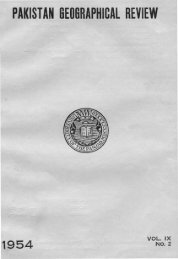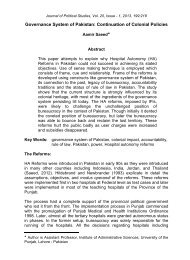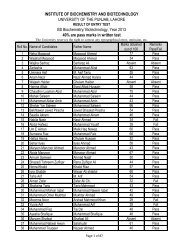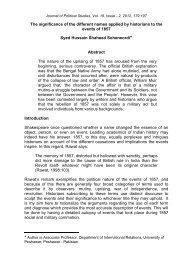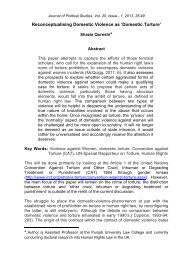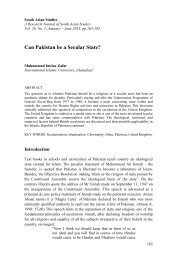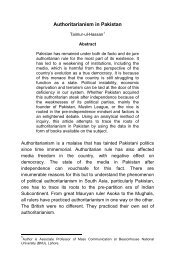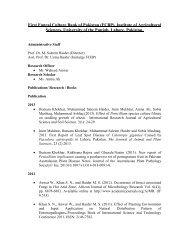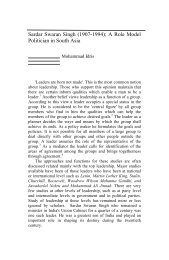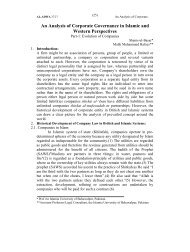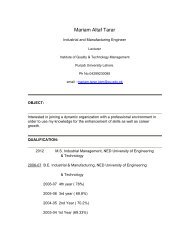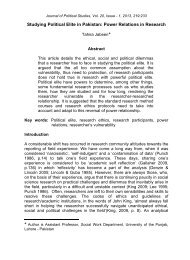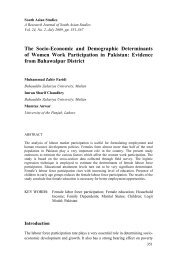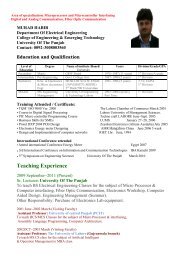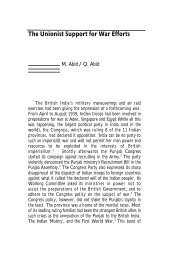4. Dr. Amir M. Haji Yousefi_January-June 2012
4. Dr. Amir M. Haji Yousefi_January-June 2012
4. Dr. Amir M. Haji Yousefi_January-June 2012
Create successful ePaper yourself
Turn your PDF publications into a flip-book with our unique Google optimized e-Paper software.
South Asian Studies 27 (1)<br />
among issues having great implications for Iran’s national security and the two<br />
countries bilateral relationships.<br />
Iran-Afghanistan relationship has been normal since 1919 when Iran gave<br />
formal diplomatic recognition to the government in Kabul except for three periods.<br />
The first period goes back to 1962 when there appeared some tensions on the issue<br />
of Hirmand River (Helmand in Afghan side) between the two states and continued<br />
for a number of years. The second period goes back to 1978 and the domination of<br />
communist groups in Afghanistan and subsequently the triumph of the Islamic<br />
revolution in Iran which caused a sort of serious ideological tension between the<br />
two states and the political and economic relationship of them reached practically<br />
to zero. The third period also goes back to the years of the establishment of<br />
Taliban control over Afghanistan since 1996 and the killing of Iranian diplomats<br />
in Mazari Sharif which resulted in an unprecedented crisis between the two<br />
countries. Apart from the above three periods, the two states’ relationship has<br />
usually been normal. The major point is that the presence of great powers in this<br />
country has exposed the Islamic Republic of Iran to them, the recent case of which<br />
is the presence of the U.S. and NATO forces in Afghanistan after the event of<br />
September the 11 th .<br />
This article seeks to study the prospects of the mutual relationship between<br />
Iran and the United States (plus NATO) as well as the grounds for Iranian<br />
intimacy and establishing cooperative or competitive relationship with the West in<br />
the scope of issues relevant to Afghanistan, while studying Iran-Afghanistan<br />
foreign relationship in different historical periods. The main question of this article<br />
is that: what does Iran want in Afghanistan and what are the prospects of Iran’s<br />
cooperation with the Western countries there? To answer this question, we first<br />
refer to main pillars of Iran`s foreign policy in Afghanistan. Secondly, we survey<br />
briefly Iran’s policy in Afghanistan from 1979 to 2001. Then Iran’s policy since<br />
the removal of Taliban from power will be discussed in the third section. In the<br />
final section, we will speculate on the possibility of future cooperation between<br />
Iran and the Western countries. Our main argument is that since Iran mainly seeks<br />
a regional solution for the current chaos in Afghanistan including its own role in<br />
state/nation-building there, the prospect for cooperation with the Western<br />
countries is not very bright.<br />
Principles of Iran’s Foreign Policy in Afghanistan<br />
Afghanistan has been at the core of Iranian foreign policy since the Islamic<br />
revolution in Iran. It can be stated that this country has been important for Iran for<br />
different reasons (Shafiee, 2003, Dehghani, 2009: 485-491). First, Afghanistan has<br />
a geopolitical importance for Iran meaning that Iranian foreign policy has noted its<br />
geographical and geopolitical situation. In other words, it has been and still is<br />
considered that Afghanistan is the neighbour of Iran and apart from the nature of<br />
politics and government in this country, Iran has to come to terms with the<br />
64



